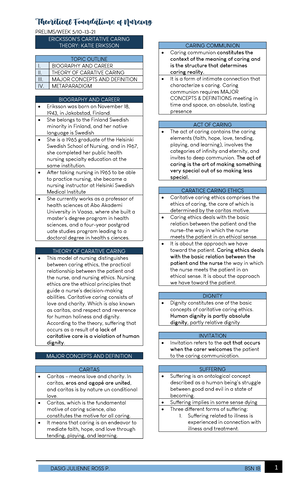- Information
- AI Chat
Was this document helpful?
Peplau
Course: BS Nursing (BSN)
462 Documents
Students shared 462 documents in this course
Was this document helpful?

HILDEGARD PEPLAU- INTERPERSONAL RELATIONS
THEORY
(PREPARED BY: GIANINA MARCELO)
“The kind of person that the nurse becomes makes a substantial
difference in what each patient will learn as he or she receives
nursing care.”
Regarded by many as, “Psychiatric Nurse of the Century”
Born on September 1, 1901 at Reading, Pennsylvania
Considered a renowned nursing leader with her writings
and researches
Has an excellent skill in leadership which prevented the American Nurses Association
from the point of bankruptcy.
1943, received her Bachelor of Arts in Interpersonal Psychology in Bennington College
in Vermont
1947, finished her Masters in Arts in Psychiatric Nursing from Teacher’s College,
Columbia
1953, finished Doctor of Education in Curriculum Development
Metaparadigm in Nursing
Person
A man, an organism that lives in unstable balance in a given system
Health
The word symbolizes movement of the personality and other ongoing human processes
that directs the person towards creative, constructive, productive and community living
One’s health can be achieve and maintained by meeting his needs which she referred to
as the psychological demands and interpersonal conditions.
Environment
Forces outside the organism and in the context of the socially-approved way of living
Derived from norms, customs and beliefs
Nursing
Significant, therapeutic interpersonal process
Nurses, together with the other members of the health team offer health services,
projecting health holistically while considering the socio-economic, spiritual emotional
and physical aspect of a person.















